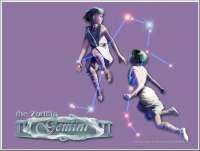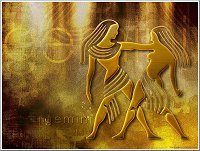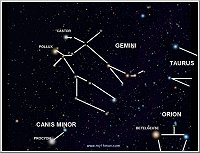GEMINI - The Twins
May 22- June 21
SYMBOL - The Twins
ELEMENT - Air
QUALITY - Mutable
RULING HOUSE - Third
PLANET - Mercury
QUALITIES
Witty
Brilliant
Knowledgeable
Popular
Versatile
Youthful
Talkative
Happy
LUCKY COLOUR - Yellow
LUCKY STONE - Agate
LUCKY DAY - Wednesday
LUCKY NUMBER - Five

Gemini
by KAGAYA
CLICK TO ENLARGE

Gemini
by KAGAYA
CLICK TO ENLARGE

Gemini
CLICK TO ENLARGE

Constellation Gemini
CLICK TO
ENLARGE
Gemini is the third sign of the zodiac, and those born
under this sign will be quick to tell you all about it.
That's because they love to talk! It's not just idle
chatter with these folks, either. The driving force
behind a Gemini's conversation is their mind.
The Gemini-born are intellectually inclined, forever
probing people and places in search of information. The
more information a Gemini collects, the better. Sharing
that information later on with those they love is also a
lot of fun, for Geminis are supremely interested in
developing their relationships.
Dalliances with these folks are always enjoyable, since
Geminis are bright, quick-witted and the proverbial life
of the party. Even though their intellectual minds can
rationalize forever and a day, Geminis also have a
surplus of imagination waiting to be tapped. Can a
Gemini be boring? Never!
(c) astrology.com |
|
Under the guise of a swan, Zeus managed to get near Leda
and had his way with her. In the course of time, Leda bore two
eggs: The first egg to hatch contained a baby girl named Helen,
famous for being the cause of the Trojan War, and a baby boy
called Polydeuces (Pollux in Roman).
These two were the divine children of Zeus. The second egg then
opened up to reveal another girl and boy, Clytemnestra (who
later became the wife of Agamemnon, the military leader of the
Greeks in the Trojan War) and Castor.
These allegedly were the mortal children of king Tyndareus of
Sparta, the legitimate husband of Leda, who had also slept with
his wife that night. According to other versions of the myth,
both boys were the sons of Zeus and Leda, and were born at the
same time with their sister Helen out of an egg. We will ignore
that version, however, because it would ruin a good story...
Hence, Polydeuces was immortal, while Castor was subject to old
age and death like every other mortal. Despite the fact that one
brother was divine and the other quite human, the twins Castor
and Pollux grew to be inseparable.
They did everything together and they loved each other dearly.
Because they were so close, they were called by one name;
the Dioscuri, which means 'sons of Zeus'.
As they were growing, they both loved all kinds of sport.
Pollux was particularly good at boxing, while Castor was
renowned for his skill in taming and training horses and for his
daring on horseback.
When Jason was recruiting the Argonauts to join him in his quest
of the Golden Fleece, the Dioscuri eagerly accepted the
invitation. During the expedition, they became very popular with
their comrades for their ability to calm the rough seas, which
once or twice had threatened to capsize their ship Argo.
Poseidon, the god of the seas, had made the twin brothers joint
saviors of shipwrecked sailors and granted them the power to
send favorable winds whenever they wished.
Another time during a storm, prayers and song to Poseidon were
offered and, after the seas had calmed, stars appeared on the
heads of the Dioscuri. That's why they are often portrayed in
imagery with stars adorning them.
Even to this day, the sight of the stars of the Dioscuri in the
sky is regarded by sailors as an omen of good luck.
While still with the Argonauts, upon their arrival in the
country of the barbarous Bebryces, Polydeuces fought
against their King Amycus, the fearsome, gigantic son
of Poseidon, and was the first man to conquer the savage brute.
During the same Argonautic expedition the Twins founded the town
of Dioscurias.
The brothers also took part in the famous hunt for the
Caledonian Boar, a terrible monster sent by goddess Artemis to
ravage the region of Calydon in Aetolia. Its King had failed to
properly honor her in his offerings to the gods and Artemis
punished him by unleashing the Boar onto his kingdom.
The hunt was memorable because it featured a woman, Atalanta,
who was the first to critically wound the beast and was
therefore awarded its pelt as a prize by a man named Meleager.
That really enraged the sons of Thestios, a couple of benighted
misogynists among the acclaimed hunters, who considered it
disgraceful that a woman should take part in the Hunt, let alone
get the trophy where men were involved. They took the skin from
her, saying that it was properly theirs by right of birth,
playing the royalty card!
Outraged by this, Meleager first warned them to reconsider,
then, when they charged at him with their swords, he cut down
the woman-hating sons of Thestios and again gave the skin to
Atalanta. Way ahead of his time.

The Dioscuri were celebrated for their expedition against
Athens. The famous Athenian prince Theseus - he of the Minotaur
fame - had happened to see their sister Helen, at nine years old
already the most beautiful mortal woman, and smitten he had
carried off the gorgeous girl to the town of Aphidnae.
Theseus intended to hide away the beauty, wait until Helen
became of age, then take the young maiden as his wife.
He forgot to first ask her brothers' permission, foolish man!
You can't just walk into Sparta, renowned for its fierce
warriors, snatch up the finest mortal female, even at nine years
old, and expect to get away with it.
The Twins were truly ticked! While Theseus was absent from
Attica, Pollux and Castor marched in and ravaged the countryside
surrounding the city of Athens.
A man named Academus revealed the location of the kidnapped
Helen and told the Dioscuri that Aethra, mother of Theseus, kept
their sister confined under her own supervision at Aphidnae.
The Twins wasted no time laying waste to the town, reclaiming
Helen and even capturing Aethra as their prisoner.
The Athenians consequently threw open their gates to the
Dioscuri, and adopted the warriors as their own sons. The Twins
became initiated in the ancient mysteries, and the Athenians
paid divine honors befitting the gods to them.
The Twins were captivated by the beauty of the daughters
of Leucippus, ultimately carrying them off and wedding them.
Pollux married the one called Phoebe, who was a priestess
of Athena; Castor's bride was known as Hilaeira or Elaeira, and
she was a priestess of Artemis. Pollux fathered two sons, Castor
three.
The Dioscuri once conspired in cahoots with the two sons of
Aphareus, named Idas and Lynceus, to pilfer a herd of valuable
oxen from the region of Arcadia. The arrangement was for Idas to
divide the booty four ways following the theft.
Idas cut up a bull into four parts and declared that, whichever
of them should be the first to eat his entire share would
receive half the looted oxen, while the second would get the
other half of the herd.
Gluttonous Idas promptly ate his quarter before the others could
give proper grace to Zeus, then quickly devoured his brother
Lynceus' quarter portion. The vulgar man then claimed the entire
herd for himself and proceeded to drive it home to Messene.
Totally uncool! Is there no honor among thieves? thought the
Twins.
The Dioscuri immediately invaded Messene, taking away the herd
of oxen corruptly claimed by Idas, and a whole lot more cattle,
just to teach him not to mess with them. This led to all-out war
between the Dioscuri and the sons of Aphareus.
Castor, the mortal of the two brothers, tragically fell at the
hands of Idas during the epic battle, and Pollux retaliated by
slaying that man's brother Lynceus. Zeus himself avenged
Castor's death by striking down Idas with a flash of lightning.
Pollux was heartbroken at the loss of his brother and prayed to
almighty Zeus to take his life as well, for he could not bear to
live without Castor. When Zeus then invited Pollux to join him
and the rest of the gods on Mount Olympus, he declined, saying
that he wouldn't like to live forever, while his beloved brother
was dead.
Zeus was so touched by the twin's love and affection for his
brother, that he arranged for them to be together again. They
could divide their time between the heavens and the Underworld,
spending one day high up in Olympus and the next day beneath the
earth, in the realm of Hades.
In further recognition of their brotherly love, he set their
images among the stars as the constellation of Gemini, so that
they would never again be separated. They stand out as two
equally bright stars in a constellation of weaker stars, joining
the honored and exalted Little Animals in a Circle.
|







